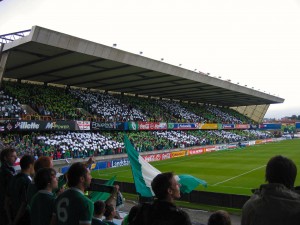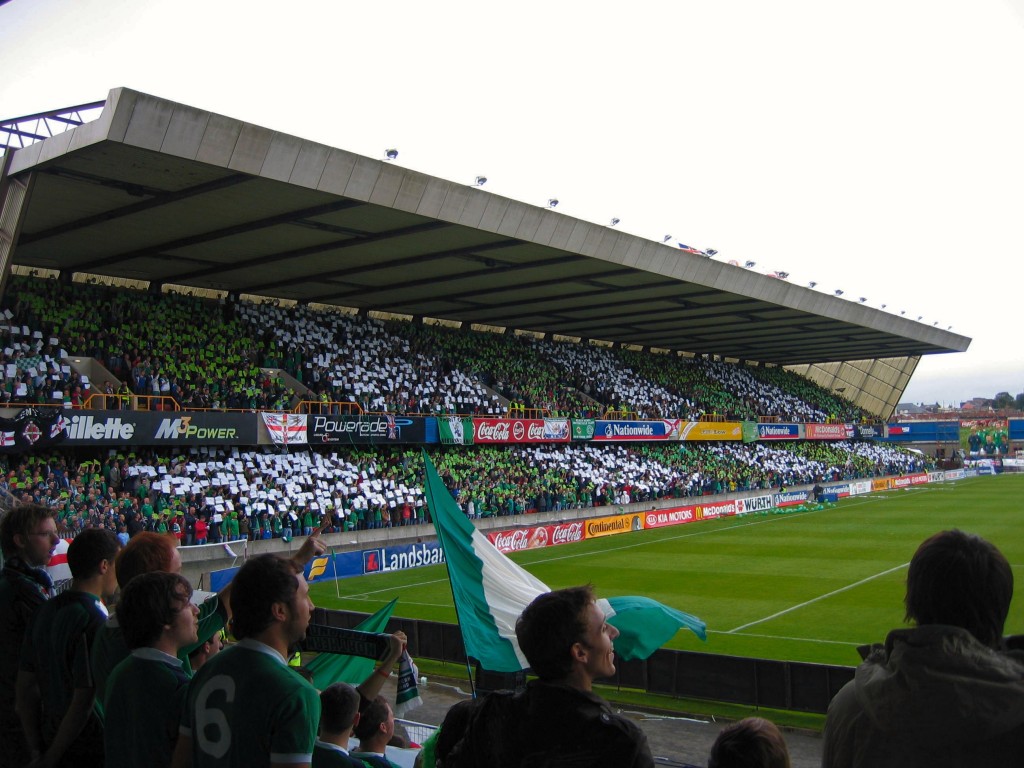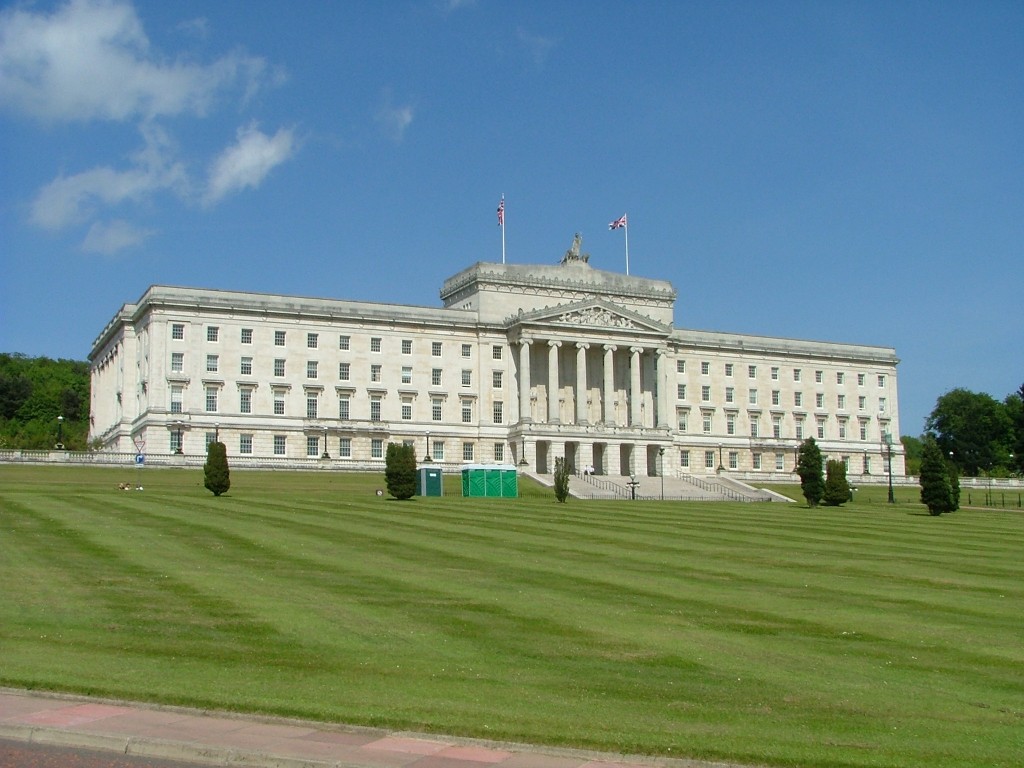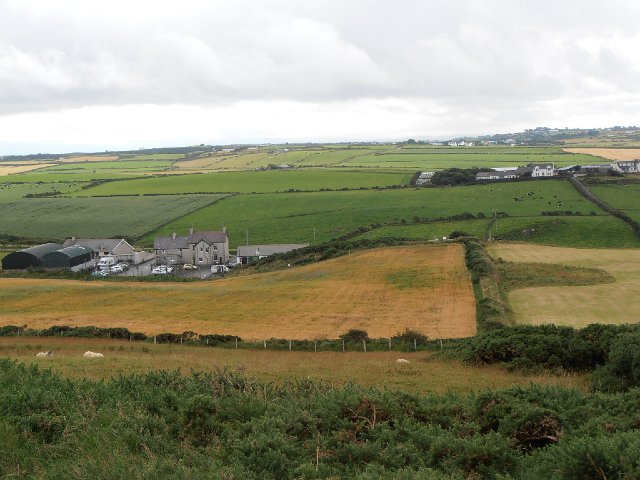
Northern Ireland Assembly, Tuesday 11 September 2007, Private Members’ Business
Mr B Wilson: As a long-standing and long-suffering supporter of Bangor Football Club and of Northern Ireland, I also wanted to mention the riots after the 1957 Northern Ireland versus Italy match, but Mr Robinson beat me to it. Riots are not particularly new.
Mr K Robinson: Was the Member at the match?
Mr B Wilson: Yes, I was.
Mr K Robinson: Was the Member at both matches?
Mr B Wilson: Yes, I was. I have been to thousands of matches over the past 50 years.
Therefore, I can speak with some authority on football. I do not have the same level of experience of GAA and rugby, because I have attended only a few matches. However, the legislation that the motion proposes the introduction of should not be restricted to football. Although Members have referred to the Football (Offences) Act 1991, any new legislation should not be restricted to that one sport. The 1991 Act is a template on which that legislation should be based, but it should apply to other sports.
The situation faced by Darren Graham has already been mentioned. However, there is also, as far as the news is concerned —
Mrs D Kelly: Will the Member give way?
Mr B Wilson: Yes.
Mrs D Kelly: I thank the Member for giving way. I am pleased that those who delivered the winding-up speeches on the motion and the amendment have acknowledged that we all have a responsibility to tackle sectarianism in sport. I am sure that the proposers of the amendment and substantive motion did not intend to allow the DUP to engage in its favourite pastime of GAA bashing. It is a pity that Mr McCausland failed to reflect on the timing of the formation of the GAA. It was formed after centuries of ethnic cleansing of all things Irish, including our language and our culture.
Mr B Wilson: I thank the Member for her intervention. I agree that there was a tendency to GAA-bash during the debate. There has been quite a number of attacks on referees at GAA matches, and so forth. However, the legislation could be useful to all sports. Therefore, the motion is not trying to tie any new legislation to football, other than its stating that the Football (Offences) Act 1991 could form the template for that legislation.
I first became aware of football in 1948, when Jimmy Jones’s leg was broken during rioting atWindsorPark. My father was at that match, and he was in quite a state when he got home. Belfast Celtic withdrew from the league as a result of that incident.
There has been sectarianism and violence at Irish League matches for the past 50 years. As aBangorsupporter, I remember once being surrounded by a group of fans. They were not Linfield supporters, but they started singing ‘The Sash’, and so forth, to try to provoke us good Protestants into attacking them, or something along those lines — I am not sure what their exact intention was. However, there was certainly a need for change then.
Mr McNarry’s amendment is fine, and we can go along with it. Several points that he made may delay legislation, however. Mr McNarry said that our motion was specific to football — its intention was to include all sports in any legislation. The tendency for other Members to attack the GAA during today’s debate is counterproductive.
Pat Ramsey said that there was sectarian chanting at sports grounds acrossNorthern Ireland“week in and week out.” I have attended quite a few matches recently, and I think that Mr Ramsey was exaggerating. There is some sectarian chanting, but the situation has changed dramatically in recent years.
Michelle McIlveen talked about the change in atmosphere at the IFA. That change has actually been happening since the 1980s. During the early 1980s, I used to take my two sons toWindsorParkto see all the international matches, and I was pretty disgusted with some of the fans’ behaviour. When theIrishRepublicbeatNorthern Ireland4–0, I had never felt so intimidated at a football match in my life, even though the fans causing the trouble were supporting the same team as me. I had to take the children home halfway through the match.
Since then, the IFA has done wonderful work and brought about dramatic changes, for which it has not been give full credit.
11.45 am
Mr McElduff and Mr Brolly said that local clubs should become involved in promoting anti-sectarianism. Ten years ago, I did not think that I would ever give credit to Linfield Football Club, but it has done a good job in trying to promote anti-sectarianism. In fact, the team now probably has more Catholic players than Protestant, which it would not have done 20 years ago. The club has links with the GAA, it has hosted camogie training sessions and it is also involved in the Dunfield initiative, which is a cross-border youth league bringing together football teams fromNorthern Irelandand the Republic. That initiative has been successful in changing the fans’ attitudes. Fans who attend internationals atWindsorParknow do not recognise it from 20 years ago, or even 10 years ago.
Ms Lo: I wish to add my congratulations to a local club. I do not go to football matches very often but, last week, I went to Donegal Celtic Football Club in westBelfast. The club opened its grounds and turned them into a miniChinatown to welcome the Chinese community. The team played a friendly game with a Chinese football team. I do not want to tell Members the score, but it was a huge humiliation: 5-0 to Donegal Celtic. Everyone enjoyed the game, and it was a wonderful night. I also pay tribute to Linfield Football Club, because it has also worked with the Chinese community. Donegal Celtic said that it hopes to play a Polish football team next. I hope that they also have a good night.
Mr B Wilson: That illustrates the progress that those clubs are making in tackling sectarianism and racism. I also recall aNorthern Ireland match against the Republic where black players from the Republic team received horrible racial abuse.
The violence must also be tackled. FIFA is now getting much stronger on violence. In the past couple of years, two international teams have had matches cancelled because of violence in their stadiums. A football offences Act would benefit the IFA, and Howard Wells of the IFA has said that he would support it. We must get rid of sectarianism, racism and violence.
Turning to the amendment, it is true that criminal penalties for football offences would have to be introduced inWestminsterlegislation. This is a cross-cutting issue, and the Department of Culture, Arts and Leisure has the lead on anti-racism and anti-sectarianism in football. InEngland, while the Home Office leads on the criminal side of football offences legislation, the Department for Culture, Media and Sport leads on anti-racism and on building a culture of tolerance and inclusion in sport.
I am glad that the Minister intends to meet his NIO counterpart later this month to discuss the possibility of introducing legislation. I find it hard to imagine that the NIO will rebuff a unanimous view from the Assembly and the Executive that action is required on such an important issue. There is no reason why the Minister and the Department of Culture, Arts and Leisure cannot drive this issue forward and get the NIO moving. The general public are always asking what politicians do to earn their money. This is an issue where recent events have shown that action is necessary now, and passing the buck to the NIO will not endear us to them.
Question, That the amendment be made, put and agreed to.
Main Question, as amended, put and agreed to.
Resolved:
That this Assembly congratulates the Irish Football Association on its campaign against sectarianism, urges all sporting bodies in Northern Ireland to undertake similar initiatives against sectarianism; and calls on the Northern Ireland Office to commence consultation with a view to introducing legislation to address sectarianism, racism and violence associated with all sporting events.



